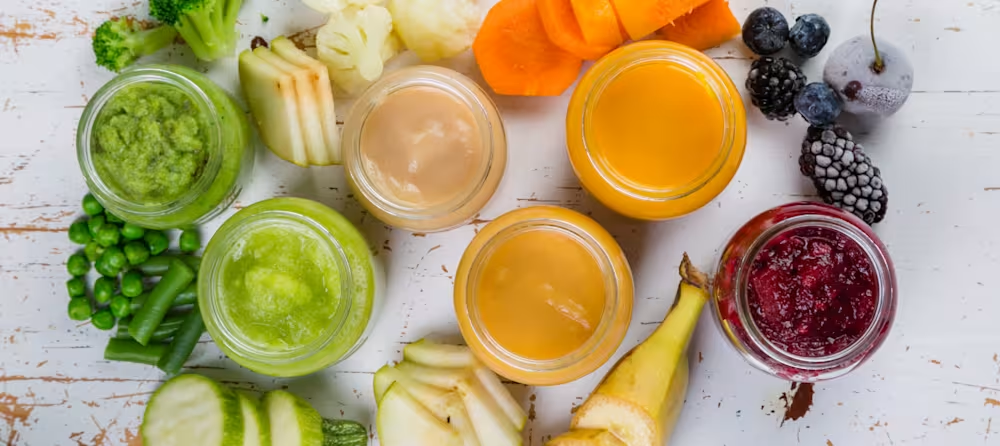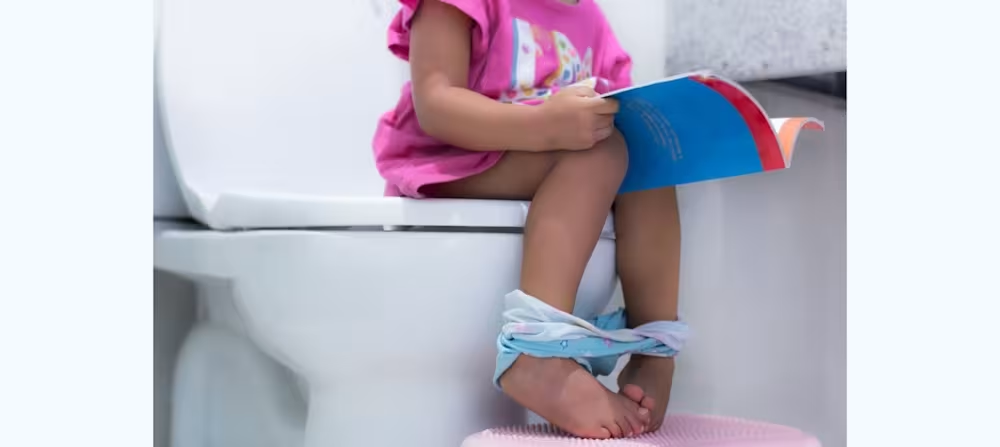How to help baby constipation when starting solids
Updated Jan 26, 2026

Here’s the thing about starting solids - while you are going to spend a lot of time thinking about what to put on your baby’s plate, you’re also going to spend a lot of time thinking about their diapers. It’s true! Monitoring a baby’s diaper is one of the best ways to assess how solid foods are being tolerated.
So no matter how you choose to begin feeding - baby-led weaning, purees, or a combination of both, you need to be ready to tackle issues like constipation. Constipation is a common challenge when starting solids, but don’t worry! Keep reading for all you need to know about constipation when starting solids.
Signs your baby is constipated
Your baby’s poop will naturally change when their diet changes, including starting solids []. Stools will likely become darker in color as well as firmer. You may also see pieces of undigested food in their diaper.
So how do you know if your baby is constipated? Many parents are surprised to find constipation isn’t really related to how often their baby poops, but rather how easy it is for them to go. Some babies poop once a day and others may go several days without a bowel movement. Typically, breastfed babies go longer between poops than formula-fed babies.
If you notice a change in your baby’s stooling habits, they might be constipated. According to Nationwide Children’s Hospital [], signs of constipation may include:
Straining more than usual when trying to poop
Looks painful or difficult to poop
Small, pellet-like poops
Fewer stools than their usual pattern
Swollen abdomen/belly
Decrease in appetite
How to prevent constipation when starting solids
Preventing constipation when starting solids may not be completely possible, but you can help lessen the chances by focusing on fluid, fiber, and movement.
Fluid
Being well hydrated (drinking enough fluid) keeps your little one’s stool soft and makes it easier to pass. When starting solids, keep the amount of breastmilk and formula the same, and watch for wet diapers throughout the day. You may also introduce small amounts — about 1 - 2 ounces (30 - 60 mL) — of . Water should not displace breastmilk or formula as the primary liquid in your baby’s diet.
Fiber
Serve your baby foods with fiber often to help make pooping easier. When starting solids incorporate foods with fiber such as whole grains, fruits, and vegetables. Some popular choices include oatmeal, avocado, berries, and sweet potatoes. Foods high in iron are also important when starting solids, but are typically lower in fiber. Be sure to offer a variety of foods to ensure all needs are met!
Movement
Physical activity helps to stimulate the bowels and makes pooping easier for babies. Allow your baby plenty of time to wiggle around on a playmat, on an activity table, or bouncer. Encourage them to kick their legs around or help them by gently bicycling their legs.
How to relieve constipation when starting solids
Offer more fluid
Make sure your baby is still receiving enough fluid via breastmilk and/or formula feeds. If they are feeding less with the addition of solid foods, you may want to switch up the time when solid meals are offered or decrease the amount of solid foods offered. Additionally, you may offer small amounts of water at meals to increase fluid intake.
Add more foods containing fiber
Offer your baby foods containing fiber with most meals and snacks. These foods include things like oatmeal, whole grain bread, nut butter as well as fruits and vegetables. Be aware of iron-fortified foods such as , as iron can cause constipation.
Serve the “P fruits”
While all fruits are good sources of fiber and can help aid in relieving your baby’s constipation when starting solids, the “P fruits” can be especially helpful. Pears, prunes, plums, and peaches may help your baby go.
Movement and baby massages
If possible, increase opportunities for your baby to be active or try a baby massage. The physical movement or touch helps to stimulate the baby's bowels to go to the bathroom. Ideas for physical activity include playing on the floor on a playmat or playing at an activity table. You may also rub their tummy to give a gentle massage or try bicycle legs.
Takeaway:
Constipation is common when solids begin: As your baby’s diet changes, stool texture and frequency naturally shift. Watch how easy it is for them to go rather than how often they poop.
Know the red flags to watch for: Pellet-like stools, straining, belly firmness, reduced appetite, or clear discomfort can signal constipation and are worth monitoring.
Fluid, fiber, and movement make a difference: Breastmilk or formula, small amounts of water, fiber-rich foods, and plenty of active floor time all support smoother digestion as solids increase.
Prevention isn’t perfect, but you can still help: Even with your best efforts, constipation can still happen. Offering high-fiber foods, “P fruits,” and opportunities to move can ease discomfort.
Support goes a long way: Adjusting meal timing, increasing hydration, and using tummy rubs or bicycle legs can help get things moving while keeping your baby comfortable.
Share article:
Note: The content on this site is for informational purposes only and should not replace medical advice from your doctor, pediatrician, or medical professional. If you have questions or concerns, you should contact a medical professional.
3 Sources
Share article:









